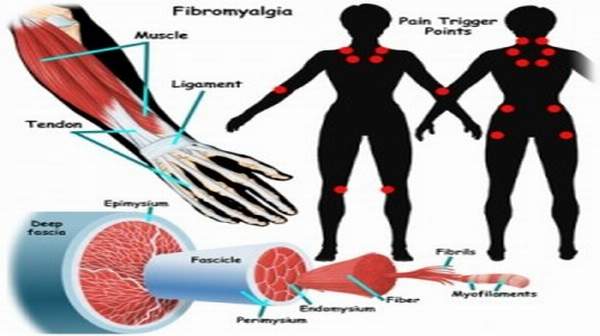What's in this article?
Fibromyalgia Overviews
Fibromyalgia is a disorder characterized by widespread musculoskeletal pain accompanied by fatigue, sleep, memory and mood issues. Researchers believe that fibromyalgia amplifies painful sensations by affecting the way your brain processes pain signals.
Symptoms sometimes begin after a physical trauma, surgery, infection or significant psychological stress. In other cases, symptoms gradually accumulate over time with no single triggering event.
Women are much more likely to develop fibromyalgia than are men. Many people who have fibromyalgia also have tension headaches, temporomandibular joint (TMJ) disorders, irritable bowel syndrome, anxiety and depression.
While there is no cure for fibromyalgia, a variety of medications can help control symptoms. Exercise, relaxation and stress-reduction measures also may help.
Fibromyalgia (FM or FMS) is characterised by chronic widespread pain and allodynia (a heightened and painful response to pressure). Fibromyalgia symptoms are not restricted to pain, leading to the use of the alternative term fibromyalgia syndrome for the condition. Other symptoms include debilitating fatigue, sleep disturbance, and joint stiffness.
Some people also report difficulty with swallowing, bowel and bladder abnormalities, numbness and tingling, and cognitive dysfunction. Fibromyalgia is frequently associated with psychiatric conditions such as depression and anxiety and stress-related disorders such as posttraumatic stress disorder.Not all people with fibromyalgia experience all associated symptoms.
What Fibromyalgia Feels Like
Fibromyalgia means widespread pain in the muscles, but this syndrome causes many other symptoms. Lab tests seldom validate your condition and the results often make you feel like a hypochondriac. Pressing on tender points can diagnose fibromyalgia, but the exam still does not explain all of your symptoms.
People with fibromyalgia often describe their symptoms as a flu-like infection that doesn’t go away. It leaves you exhausted and unable to think or find the right words (symptoms of fibro fog). With fibromyalgia, you have trouble sleeping and wake up stiff and achy. Your symptoms can be debilitating and you probably feel as though you have to push yourself to get anything done.
Top Ten Fibromyalgia Symptoms:
♦ Pain all over
♦ Fatigue
♦ Sleep difficulties
♦ Brain fog
♦ Morning stiffness
♦ Muscle knots, cramping, weakness
♦ Digestive disorders
♦ Headaches/migraines
♦ Balance problems
♦ Itchy/burning skin
People with fibromyalgia may also have other symptoms, such as
♦ Trouble sleeping
♦ Morning stiffness
♦ Headaches
♦ Painful menstrual periods
♦ Tingling or numbness in hands and feet
♦ Problems with thinking and memory (sometimes called “fibro fog”)
No one knows what causes fibromyalgia. Anyone can get it, but it is most common in middle-aged women. People with rheumatoid arthritis and other autoimmune diseases are particularly likely to develop fibromyalgia. There is no cure for fibromyalgia, but medicine can help you manage your symptoms. Getting enough sleep, exercising, and eating well may also help.
Fibromyalgia Quick Facts
♦ Affects 3 to 5 percent of the general population
♦ Occurs in people of all ages, even children
♦ Men develop fibromyalgia too, although more women are diagnosed with it
♦ Symptoms are chronic but may fluctuate throughout the day
♦ Roughly one-quarter of people with fibromyalgia are work-disabled
♦ Three drugs are FDA-approved for fibromyalgia treatment






